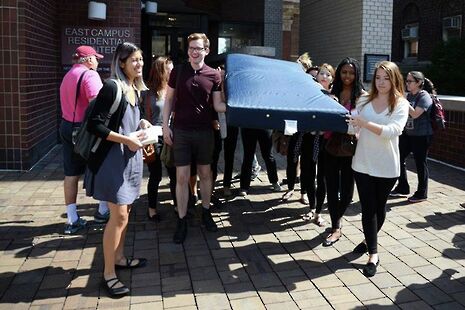Cambridge students discuss fighting sexual violence
A discussion entitled “Fighting Sexual Violence in Universities and Beyond” was hosted this Wednesday

This Wednesday the Cambridge Sexual Violence Policy Campaign hosted a discussion entitled “Fighting Sexual Violence in Universities and Beyond”.
The forum, chaired by Emmanuel’s Roberta Huldisch, centred on the challenges faced by activists trying to change sexual assault and harassment policy within the university and its colleges.
While the panel touched on challenges such as under-educated tutors and the problems posed by the fragmented college system, much of the debate was focused around the controversial Zellick Report.
First published in 1994, the Zellick Report advised universities against investigating serious offences unless the matter had already been taken up by the police.
However, the group was of the opinion that this policy had failed women, with one commentator calling the document “outdated”.
Indeed, the event comes in the wake of an increasing number of reports and surveys highlighting the problem of sexual assault and rape on campus.
A 2014 survey by the CUSU Women’s Campaign found that over three-quarters of students had been harassed and 30 per cent assaulted. What’s more, only 12 per cent of these cases were reported.
It was also revealed that only two students said that they had reported the incident to the police, with 10 taking the incident up with staff or welfare officers in their college. Bryony Beynon, who co-directs the Good Night Out campaign, pointed out that the evidence barrier in the criminal justice system can make dealing with the police a very frustrating experience for survivors, and that the process can be made more difficult since “the Crown Prosecution Service barrister is very likely to be ‘of a certain identity’”.
Members of the audience and panel told anecdotes describing their own frustrations in dealing with the police. Speaking to Varsity after the event, Ella Raff recalled one student advisor at a Russell Group university who “would not refer students to the police”.
Raff, who co-founded End Rape on Campus UK, further noted that “a lot of people drop out” due to traumatic experiences in dealing with police.
Given the hesitance of many survivors to involve the police, it was felt by many that the Zellick Report puts survivors in a difficult position, with Raff admitting “it’s a bit of a paradox”.
Much of the remaining discussion was oriented around the role of the university and colleges, and how to change this.
Nikolas Oktaba, an MPhil student at the university, brought up recent developments in the US, where the Title IX legislation has been used to force universities into policy change.
Title IX bans the use of federal money to support sex discrimination in education, and audience members raised the idea of using comparable legal mechanisms, such as the Human Rights Act or the Public Sector Equality Duty, to make similar progress.
However, Ella Raff cast doubts on such efforts, pointing out that with these British laws you cannot sue in general terms; the plaintiff has to have been directly affected.
The group agreed that this puts a lot of pressure on individuals to put their lives on hold to pursue a case, with most accepting that potential financial and academic costs were understandably high hurdles to overcome.
Raff described how one exceptional case, where Oxford student Elizabeth Ramey took legal action against her university, failed on a technicality.
Ramey had hoped that her case, fought in 2015, would force a change of policy, arguing that the university’s guidelines on harassment failed to comply with equality laws. The judge ruled that Ms Ramey’s case lacked substance as she was no longer at the university.
Rather than through legal routes, some hoped that change could be made through the internal structures of the university.
Indeed, Charlotte Chorley, CUSU Women’s Officer, suggested that the university was close to a new protocol, which she hoped would be finished by Lent.
That policy is being developed by Graham Virgo, Pro-Vice Chancellor for Education, and must go through a committee stage first.
Chorley said that the completed policy could introduce a new “assault and harassment advisor” who would be “fully trained in rape and harassment [advice] and deal with those cases”.
She also expressed hope for a related policy training tutors to deal with racial and sexual harassment cases, an idea proposed by, and developed in discussion with, CUSU President Priscilla Mensah.
But optimism remained measured; Chorley herself noted that the colleges are independent institutions which are “not bound by what the university does.”
Raff had similar concerns, noting that while the people in charge are not “bad people”, many are unwilling to “go out on a limb”.
However, Raff emphasised that “the university having a centralised policy would be fantastic” as it would set a precedent for all colleges.
 News / Clare Hall spent over £500k opposing busway 24 December 2025
News / Clare Hall spent over £500k opposing busway 24 December 2025 Comment / The ‘class’ of Cambridge24 December 2025
Comment / The ‘class’ of Cambridge24 December 2025 News / Caius mourns its tree-mendous loss23 December 2025
News / Caius mourns its tree-mendous loss23 December 2025 News / Girton JCR publishes open letter expressing solidarity with Palestine25 December 2025
News / Girton JCR publishes open letter expressing solidarity with Palestine25 December 2025 Comment / Yes, I’m brown – but I have more important things to say22 December 2025
Comment / Yes, I’m brown – but I have more important things to say22 December 2025









